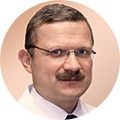Immunity of recovered COVID-19 patients could cut risk of expanding economic activity
Dariusz J. Nasiek, MD - Medycyna Estetyczna / Aesthetic Medicine
May 14, 2020
While attention remains focused on the number of COVID-19 deaths and new cases, a separate statistic - the number of recovered patients - may be equally important to the goal of minimizing the pandemic's infection rate as shelter-in-place orders are lifted.
The presumed immunity of those who have recovered from the infection could allow them to safely substitute for susceptible people in certain high-contact occupations such as healthcare. Dubbed "shield immunity," the anticipated protection against short-term reinfection could allow recovered patients to expand their interactions with infected and susceptible people, potentially reducing overall transmission rates when interactions are permitted to expand.
New modeling of the virus' behavior suggests that an intervention strategy based on shield immunity could reduce the risk of allowing the higher levels of human interaction needed to support expanded economic activity. The number of Americans infected by the novel coronavirus is likely much higher than what has been officially reported, and that could be good news for efforts to utilize their presumed immunity to protect the larger community.
However, there are two important caveats to the strategy.
The first is that the duration of immunity to reinfection by SARS-CoV-2 remains unknown; however, individuals who survived infections by related viral infections, like SARS, had persistent antibodies for approximately two years—and those who survived infection to MERS had evidence of immunity for approximately three years.
The second issue is that determining on a broad scale who has antibodies that may protect them from the coronavirus will require a level of reliable serological testing not yet available in the United States.
Identification of individuals who have protective antibodies against the novel coronavirus has begun only recently. Antibody tests are not 100% specific, implying that tests can lead to false positives. However, targeted use of antibody testing in groups with elevated exposure will lead to increases in positive predictive value, even with imperfect tests. The serological antibody test differs from widespread polymerase chain reaction (PCR) testing being done to determine whether people are actively infected with the virus.
Among healthcare professionals, serological testing could identify recovered individuals who might then be able to interact with patients with reduced concern for infection. Other recovered individuals could be used to help reduce transmission risk in nursing homes, the food service industry, emergency medical services, grocery stores, retailing and other essential operations. Across society, the relatively small number of individuals with immunity could substitute for people whose immunity status isn't known; reducing transmission risk both for recovered individuals and those who remain immunologically naive.
Serological testing to identify those with immunity might begin with healthcare workers, who may be more likely to have been infected by the coronavirus because of their exposure to infected persons. Because so many infections do not produce the distinctive COVID-19 symptoms, it's likely that many people have recovered from the illness without knowing they've had had it, potentially expanding the pool of recovered persons.
Rather than trying to keep reducing interactions, which is helpful for reducing transmission but bad for what it does for the economy, we might be able to maintain interactions while reducing the risk, combined with other mitigation approaches.
Ultimately, addressing the pandemic will require development and mass production of a vaccine that could boost immunity levels beyond 60 percent in the general population. Until that is available shield immunity could become part of the approach to the challenge.
Until we have a vaccine, we will have to use a combination of strategies to control COVID-19, and shield immunity is potentially one of them.
Nasiek, Dariusz, MD
Aesthetic Medicine
Garfield, NJ
SPONSORED ARTICLE
For the most up-to-date information, please contact the company directly.The photos contained in the article serve only as an illustration of the article.

Dr Dariusz J. Nasiek, MD
American Board of Anesthesiology
American Board of Pain Medicine
American Board of Interventional Pain Physicians
Expertise:
- Author of the book “PRP – New Paradigm in Regenerative Medicine”
- Thousands and thousands of procedures performed in the OR
- Hundreds of legal cases represented
- 50s interviews given and articles written
- Dozens of seminars conducted
Uniqueness:
- The only practice of neurology and interventional pain dedicated 100% to helping accidents victim
BUSINESS ONLINE CATALOG
Latest News
Ogłoszenia Dodaj ogłoszenie
Mieszkanie, Wrocław Centrum 3 pokoje Trzypokojowe mieszkanie znajduje się w centrum miasta, dzielnica Wrocł Lokal - Wynajmę
Biurko dla firmy wynajmę Biurko do wynajęcia dla małego biznesu (walk-in) w Passaic, NJ lub na Nieruchomość - USA
Floryda. Do wynajęcia 3 sypialniowy "Key West Style" dom z basenem i t Do wynajecia 3 sypialniowy "Key West Style" dom z basenem i unikalnym tr Nieruchomość - USA
OKAZJA! Apartament na 7. piętrze -Floryda Słoneczny umeblowany w pełni wyposażony apartament na siódmym piętr Nieruchomość - USA
Agent Nieruchomosci w Chicago Karolina Bak Agent SRS,SFR,RENE 2015 West Fullerton Avenue, Chicago, Ill Nieruchomość - USA
Polski Sklep na Sprzedaż w New Jersey
